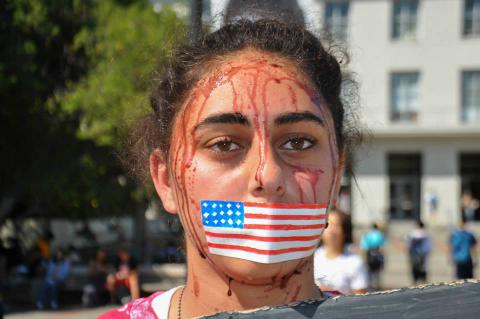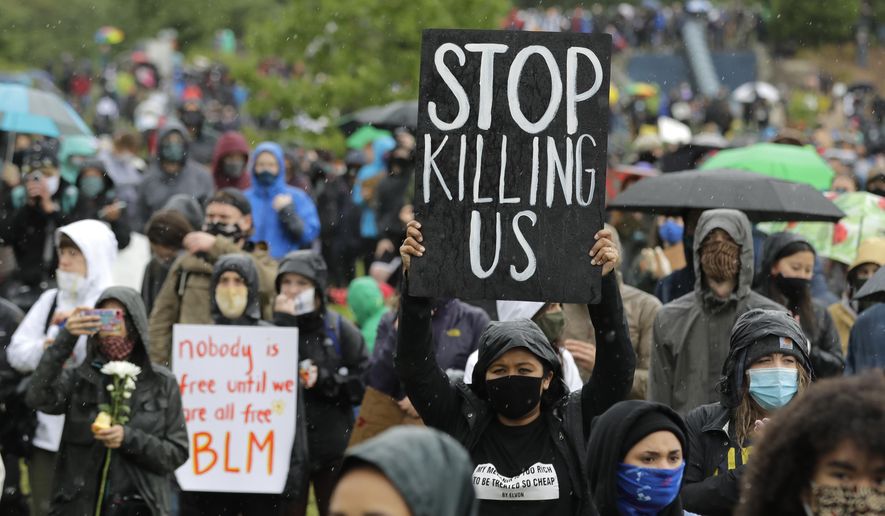Trump Wanted to Send in the Troops. Now Some Are Ready to Quit.
Sarah Jones / The Intelligencer @ New York Magazine
(June 10, 2020) — Protests demanding justice for George Floyd have been overwhelmingly peaceful. But as unrest over Floyd’s killing by the Minneapolis police entered its first full week, President Trump pined for resolution.
In a press conference, he warned that if cities and states won’t “defend the life and property of their residents,” he’ll “deploy the United States military and quickly solve the problem for them.”
He enjoyed at least some support from his party. It was time to send in the troops, Senator Tom Cotton of Arkansas wrote in the New York Times. Several Army units are on stand-by for possible deployment.
Under any president, the prospect of federal troops in American streets would invite accusations of authoritarianism. But Trump is a special case. The protests tarnished his reputation as the prince of law and order and so he wanted a cudgel.
To a president who threatened protesters with “the most vicious dogs” and tear-gassed his way to a photo-op, the military looked like a blunt instrument.
But soldiers aren’t dogs, and may object to being used as such. In the ranks, dissent blooms.
Organizations that provide advice and assistance to conscientious objectors and dissidents in the military say that since governors first mobilized National Guard units to put down protests, they’ve heard from service members who object to their orders.
Trump and Cotton were eager to send in the troops, but the troops themselves were somewhat less enthusiastic.
“There are a lot of concerns, and there’s a lot of personal conflict and moral crisis that service members are experiencing right now,” said Garett Reppenhagen, the executive director of Veterans for Peace and an Army veteran. “In the last 15 years, we’ve seen our foreign conflicts escalating all over the world. But I don’t think that folks thought that the global war on terror would be fought here in our country against Americans.”
Trump’s threat unsettled high-ranking officials, too. In a rare break with Trump, Defense Secretary Mark Esper described the use of the military for domestic law enforcement as “a matter of last resort.” Mike Mullen, a retired admiral and the former chairman of the Joint Chiefs of Staff, condemned the proposal in an editorial for The Atlantic. In a statement published by the same outlet, Esper’s predecessor, retired general Jim Mattis, warned that militarizing the protest response “sets up a conflict — a false conflict — between the military and civilian society.”

That conflict may already be underway. By June 1, CNN reported, there were as many guardsmen on protest duty in the U.S. as there are active-duty troops in Iraq, Syria, and Afghanistan combined, though numbers are now declining as governors begin to send their units home. Mobilized to support state and local police officers in addition to federal law enforcement, guardsmen have not helped de-escalate tensions.
In Louisville, Kentucky, members of the National Guard shot and killed David McAtee, a beloved local restaurant owner. Another guardsman reportedly fired live ammunition at a car in Minneapolis, though no one was injured. Videos taken in Washington, D.C., show National Guard helicopters flying deliberately low over protests. Rotor wash knocked tree branches into the street.
For one member of the National Guard, the possibility of harming civilians is too much to stomach. “Essentially, the events of the last week (escalating police violence against protesters, the militarization of the police response, political factors fueling political conflict) sort of catalyzed in me a realization in my heart that I cannot continue to engage in violence or be complicit in it,” he wrote to Intelligencer by encrypted text. The guardsman, who must remain anonymous to protect his identity, was deployed to a major American city. He has decided to leave the service as a result of his orders.
There’s no way to determine exactly how many guardsmen or active-duty soldiers are prepared to take similar action. But Reppenhagen said that service members have reached out to his organization through email and social media, asking for help as they consider their next steps.
Other groups, including the GI Rights Hotline and About Face: Veterans Against the War confirmed that they’ve also received queries from service members who have either been mobilized in response to the protests, or fear they will be soon.
“Some of them are just exploring their options and seeing what’s available to them, and what the legality is of various decisions they could make,” Reppenhagen explained. Others are looking for direct contact with lawyers.
“Some have already made a decision not to deploy and not to report for duty. And they’re trying to figure out what the repercussions are going to be for them, and how to mitigate it,” he added.
In Reppenhagen’s view, the right of a service member to refuse an unlawful order provides them with some protection, though he said it can be ambiguously interpreted and defined. Service members have cited it in the past with mixed results.
In one high-profile case, Army lieutenant Ehren Watada refused orders to deploy to Iraq in 2006 due to his belief that the war was illegal. After three years of court martial proceedings, the Army eventually allowed him to resign.
There are other, potentially more drastic options for service members who don’t want to deploy against fellow citizens. “There’s G.I. resistance, which involves ignoring orders, failing to cooperate with orders, going AWOL, filing for conscientious objector status, and things of that nature, which are different levels of escalation, and have different consequences through the Uniform Code of Military Justice,” Reppenhagen explained.
Jacob Maier, a former Marine who volunteers with About Face, said that the stakes attached to any act of disobedience “can be scary.” Disturbed by the travails of LGBT Marines and by the invasions of Iraq and Afghanistan, Maier filed for conscientious objector status while he was still in the military. “I couldn’t justify my service in the Marines anymore, feeling that way,” Maier said. He was discharged eleven months later.
“The consequences are steep, but I don’t think any of them come close to the kind of burden on your conscience if you were to obey an immoral order,” he added.

For other service-members, the penalties for resistance aren’t as disturbing as the thought of being ordered to put down protests. Like the guardsman, who said he was “especially affected” by the involvement of fellow National Guard members in the Louisville shooting, they’re experiencing their own moments of reckoning.
An active-duty soldier in touch with About Face told Intelligencer that when he first enlisted, he was apolitical, and found Army life mundane. “I didn’t really foresee myself ever being in this kind of scenario, where I would have to seriously think about shooting an American citizen,” he said. After he deployed to Iraq, he became more critical of what he described as “the overall mission of the military.” Now that his unit is on stand-by, meaning it could still be called up by the Pentagon to quell unrest, he’s reached a difficult conclusion. He’s prepared to defy orders to deploy.
“I want to make it clear, I don’t want to go to prison,” he said. “But I have children. When they’re adults, I want them to look at their dad, and be able to say that when he was faced with this tough situation, he had the courage to stand up and do what he felt was right by the people of America. Not that he was a cowardly soldier who was just following orders.”
Posted in accordance with Title 17, Section 107, US Code, for noncommercial, educational purposes.